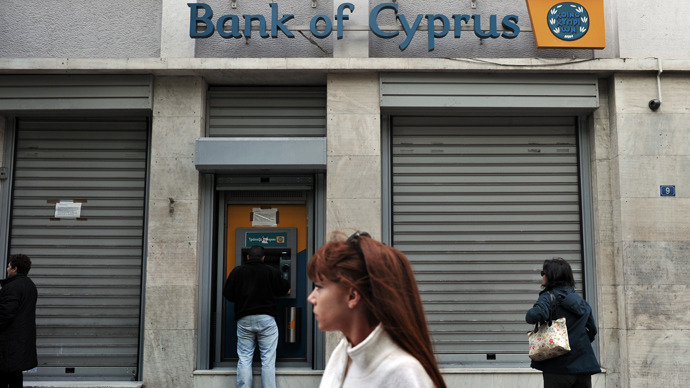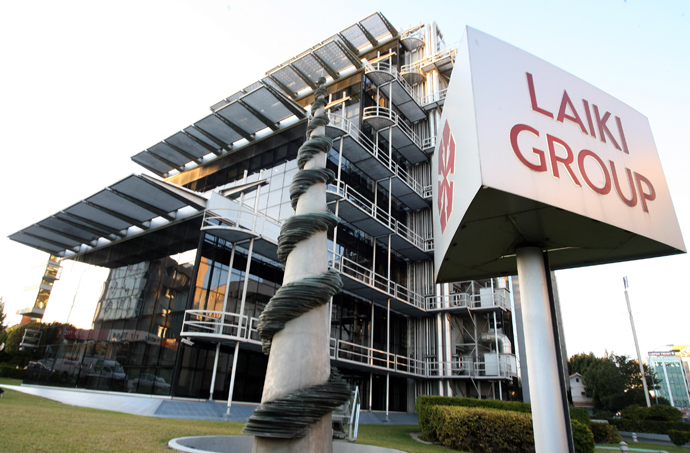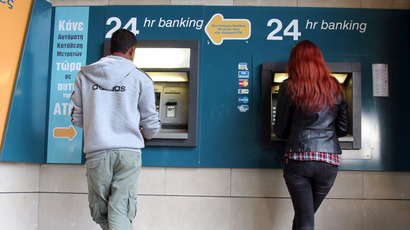Russian business looks to capitalize on Cyprus bailout

Cyprus’s rejection of the European Union’s tax levy plan to finance the country’s bailout has piqued the interest of Russia’s biggest and most important businesses.
The proposed levy put over $31 billion of Russian money at risk
of taxation, sent Russian stocks to a three month low on March
18.
Russian depositors would be especially hard hit by any levy, but so
would Russian business, as Russia is a major player in the Cyprus
banking industry.
According to rating agency Moody’s, Russians hold $31 billion in
Cyprus banks and could lose more than $3 billion in the levy.
Nearly a third of the money in the Cyprus banking sector is
Russian.
After negotiations fell apart at home, Cypriot Finance Minister
Michael Sarris jumped on a plane to Moscow and met with his Russian
counterpart Anton Siluanov to discuss loan extensions and bailout
options. But as of Wednesday the talks hadn't lead to any result
yet. Talks will continue on Thursday and Sarris said he will stay
in Moscow 'as long as it takes' to strike a deal.
According to Moody’s, VTB group is ‘the most exposed’ to
the credit crisis in Cyprus. VTB's subsidiary, Russian Commerce
Bank, operates in Cyprus and is one of few to possess a full
banking license. However the bank is an active member of the
deposit insurance system of Cyprus and VTB has only 3% of its
capital tied up in Cyprus, which, according to First Deputy Chief
Executive Officer Vasily Titov is ‘insignificant’ and should not be
‘dramatized’, as he told reporters in Moscow on Wednesday.
But whatever decision is taken on the fate of deposits, held on the
island, Russian Commerce Bank is obviously going to change its
long-term development strategy and re-evaluate the risks, but at
the same time maintain current business partners and clients loyal
to the bank, Ekaterina Kondrashova from Investcafe independent
analytical agency said.
"I would like to underline, that the Cypriot subsidiary of VTB
provides financing for export-import operations by Russian and
foreign companies, including pre-export and post-export financing
and provides documentary and forfeiting services. It also operates
on the stock market, carries out credit operations and provides
private banking service," Kondrashova noted.
Not the tax haven imagined
Foreigners hold almost 40% of the €68 billion in Cypriot banks, who
take advantage of the island’s low tax rates and light regulation.
The corporate tax rate in Cyprus is 10%, half of Russia’s, which
can make it deceptively attractive.
The recent turmoil in Cyprus has led other Russian business
analysts to distance themselves from the economic woes of Cyprus,
and are not eagerly jumping in to save the day.
“It shows those Russians who keep their accounts in Cyprus that
it’s not a heaven, it’s a hell. It will encourage a lot of Russian
companies to concentrate their resources in Moscow,” Sergey
Cheremin, head of Moscow’s department for economic and
international relations told Bloomberg.
Prominent independent financial advisor and author Patrick Young
weighs in, saying that “larger savers and corporations who found
Cyprus an attractive climate for business have already set their
eyes on other financial centers.”
“Dubai and Singapore are early leaders - mercantile and politically
stable but without the dreadful tinge of desperation which now
hangs over the Eurozone. The deficit of trust is only exacerbated
when listening to the cowardly howls from finance ministers that
they never supported a ‘haircut’ of savers’ funds in Cyprus. If the
Eurozone finance ministers didn’t make this decision while locked
in conference for days, then who did?" Young wrote in his RT
blog.
Help from Moscow?
Andreas Charalambous, a senior finance ministry official in Cyprus, said Nicosia wanted to “explore other avenues of financing to lessen the burden” extraordinary measures, such as a revised deposit levy. One option would be for Russia’s Gazprombank, the lending arm of Russia’s energy giant, to take over and recapitalise Laiki, the second-largest Cypriot bank, the Financial Times reported Wednesday.
The second options came to light when Russia’s giant energy
company Gazprom allegedly made a private bailout offer to Cyprus
according to the New York Times on Wednesday. The island economy
can raise money needed to keep it afloat by selling Gazprom
exploration rights to offshore gas deposits in the Mediterranean
Sea. Gazprom however refused to comment on the news or even confirm
it made such an offer. Sarris has denied this allegation.

Meanwhile Russian businessman and politician Mikhail Prokhorov
views helping Cyprus as an opportunity to further Russian economic
interest and to flex its muscle in the European political
ring.
“Now is a chance to demonstrate Russia as a strong player on the
world stage,” Prokhorov wrote in Vedomosti newspaper on
Wednesday. "Russia is a creditor of Cyprus and has sufficient
financial capacity to save the financial system of the Cyprus
market," Prokhorov said, stressing Cyprus is an important
economic partner for Russian business.
Prokhorov wants the Russian business community to present a united message on Cyprus, and to ‘ensure stability of the Russian financial system and depositors,” referring to the $31 billion Russians hold in Cyprus’ banks.















